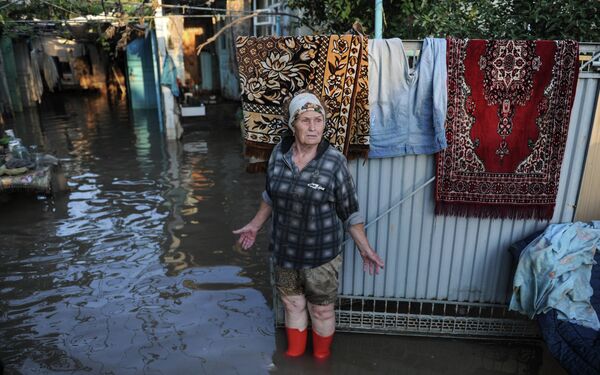An order to impose a state of emergency in the southern Russian town of Krymsk, where over 150 people died in flooding earlier this month, was backdated to make it appear that it had been issued earlier, investigators said on Wednesday.
“We established that the document which the city administration showed us – the decree introducing a state of emergency over the torrential rain – was falsified,” said Alexander Bastrykin, the head of Russia's Investigation Committee.
He said the decree was not issued - as claimed by the city administration - on July 6, when the floods hit.
“Via computer records, we established that this decree was introduced at 6 a.m. local time on July 7, when most people were already dead,” he said.
Emergency Minister Vladimir Puchkov admitted earlier this month that warnings were not issued quickly enough to people in Krymsk, the worst hit town in the flood-stricken Krasnodar area.
Bastrykin stressed that the decree was a mere formality. “It contained 32 points, most of them impracticable.” For instance, one of the points said that 32 trucks to evacuate people must be allocated in five minutes. “The city administration was in disarray,” he added.
The local meteorological service issued alerts warning of possible torrential rains and flash floods on July 5, but local authorities took no action, Bastrykin continued. In such circumstances, the city’s staff in charge of prevention of emergencies should have convened for a meeting but this was never done.
“Out of the 30 members of the emergency staff, 25 members did not come to the meeting.”
“We looked into what the city administration did on July 5 and 6…We drew up a schedule of what the municipal administration should have done and what it actually did,” Bastrykin said.
Regional emergency officials, who had at least three hours advance knowledge of the impending disaster, say they broadcast flood warnings on local Krasnodar region television channels, despite the fact that torrential rains had cut power to much of the area.
Few people in Krymsk said they were aware that the town had a flood warning system.
Many of the victims - mainly elderly residents - would have survived if they had received the alarm 10-15 minutes earlier.
On Sunday, three local officials - Krymsk district head Vasily Krutko, Krymsk mayor Vladimir Ulanovsky and local emergency response chief Viktor Zhdanov - were sacked and arrested on charges of official negligence.
The village chief in nearby Nizhnebakansk, Irina Ryabchenko, could face the same charges for failing to properly alert residents to the potential dangers of a fast-approaching heavy thunderstorm.
The charges carry sentences of up to seven years in prison.
After his second trip to the flood-ravaged Krasnodar Region, President Vladimir Putin said: “If it turns out that some official did not fulfill his duties in a timely manner, including the duty of providing advance warning about a flood threat. They will be held responsible in accordance with the law.”
Alexander Tkachev, governor in the flood-hit region, said on Wednesday that he would decide on his future after the Investigation Committee had finished its probe.
“The Investigative Committee is currently probing the activities and responsibility of all administrative structures in the area, from local to regional. And I will decide on my resignation only when final decisions are made."
He said he was unaware of the emergency decree falsification and “learned of it only at this meeting.”
Tkachev fanned national anger over the handling of the floods when he responded to criticism that people had not been warned in time by saying: “Were we supposed to get round to every single person?”
The disaster is just the latest in a long line of natural or man-made catastrophes to have hit Russia in recent years and the Kremlin has worked hard to ensure minimum political damage to President Vladimir Putin.


